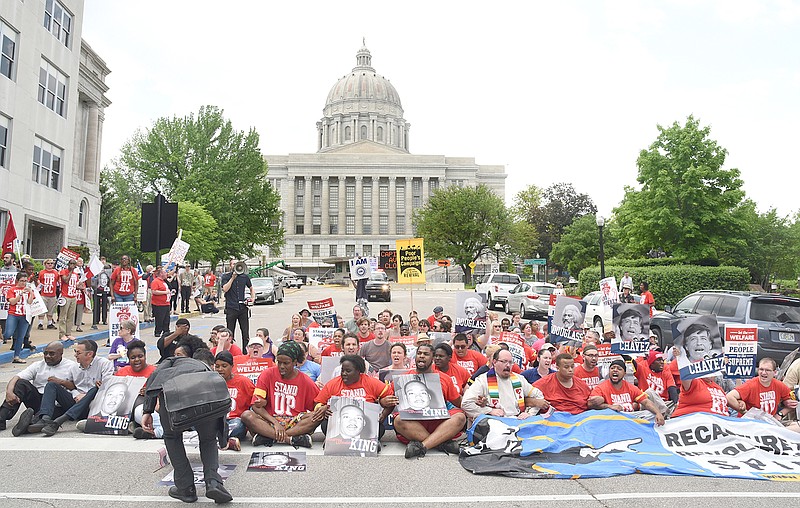Jefferson City police cited 88 people following a demonstration downtown early Monday afternoon.
Each of the defendants faces a city charge of obstructing police (failure to obey police), a misdemeanor.
The charge carries a penalty of up to a $1,000 fine and/or up to 90 days in jail, according to the Jefferson City Municipal Court Clerk's Office.
The defendants are members of the Missouri Poor People's Campaign and were participants Monday in a national call for "moral revival" intended to kick off six weeks of nonviolent action across the country. The campaign also is intended as a revival of Martin Luther King Jr.'s Poor People's Campaign.
The protest was one of about 40 conducted in state capitals, said Rod Chapel, a Jefferson City attorney who stood by to assist members of the group with legal representation.
Chapel was among the attorneys who represented the Medicaid 23, a group of mostly clergy members arrested in May 2014 during nonviolent protests in the state Capitol aimed at urging lawmakers to expand Medicaid.
Those arrested during the Poor People's Campaign demonstration were among more than 200 people who marched Monday to the lawn in front of the Capitol for a rally.
While there, speakers urged listeners to support their causes, demanding - among other things - higher wages, health care and the end of a "morally corrupt budgeting process," said Rabbi Doug Alpert of Congregation Kol Ami in Kansas City. Hailing from not only Kansas City, but St. Louis and dozens of other Missouri communities, the group called on lawmakers to be more responsive to the needs of America's working poor.
"I'm thrilled to see this mass of people coming from all across the state," said the Rev. Jon Bennett, a retired Jefferson City pastor. "I can remember the campaign from Dr. King's era. I'm glad there's a component of it here in Missouri."
There is strength in the numbers, said Jefferson City resident Mike Hayes, who lived for a time in Kansas City. Hayes, an activist for living wages who works two jobs, said people gathered wanted to let lawmakers know they are unhappy with the Legislature's decision to override decisions by voters in Kansas City and St. Louis that would have raised those cities' minimum wages.
In 2017, Kansas City and St. Louis voters passed measures to raise local minimum wages to $10 an hour, but Missouri legislators passed a preemptive statute that prohibited local governments from raising minimum wages above the state level of $7.70.
"Anybody working 40 hours shouldn't live in poverty," Hayes said. "This is for our state legislators who have denied our cities the right to raise wages to a living wage."
Shortly after noon, people participating in the rally returned to the streets, marching and chanting. They walked east on Capitol Avenue and sat in the roadway at Jefferson Street. After about 15 minutes, the group stood up, walked up Jefferson to High Street, turned west and marched to Broadway Street, where they walked downhill to the north. Once they reached West McCarty Street, many sat in the roadway.
The protesters sang and chanted. When police told them they were blocking the street and could be arrested, they continued to sit. After about an hour, police began leading protesters away in groups of about 10 and cited them.
The intention of the march was to conduct civil disobedience that coincided with similar events in other capital cities, Chapel said.
"There is a broad spectrum of people being hurt by legislation on a state level," Chapel said, "and on the federal level."
Organizers intend to revisit the protest every Monday until June 18. Those who chose to put themselves in the position where they might be arrested have received training in nonviolent protest, he said.
"Everybody's committed to nonviolence," Chapel said. "So this is aligned with Martin Luther King Jr.'s vision of nonviolence."
Jefferson City police have been receptive to allowing people to participate in civil unrest, he added.
"One of the takeaways for us," he said, "is people who practice free speech here in Jefferson City - the police department makes sure that happens safely."
Officers went out of their way to block automobile traffic on streets and to look out for the needs of elderly or infirm who participated in the march, Chapel said. City Public Works employees also managed traffic lights to ensure protesters' safety.
"Police treated everyone with respect," he said. "They upheld the law in a way which is at the core of police tradition. In many other places in America, you don't get that level of protection."

